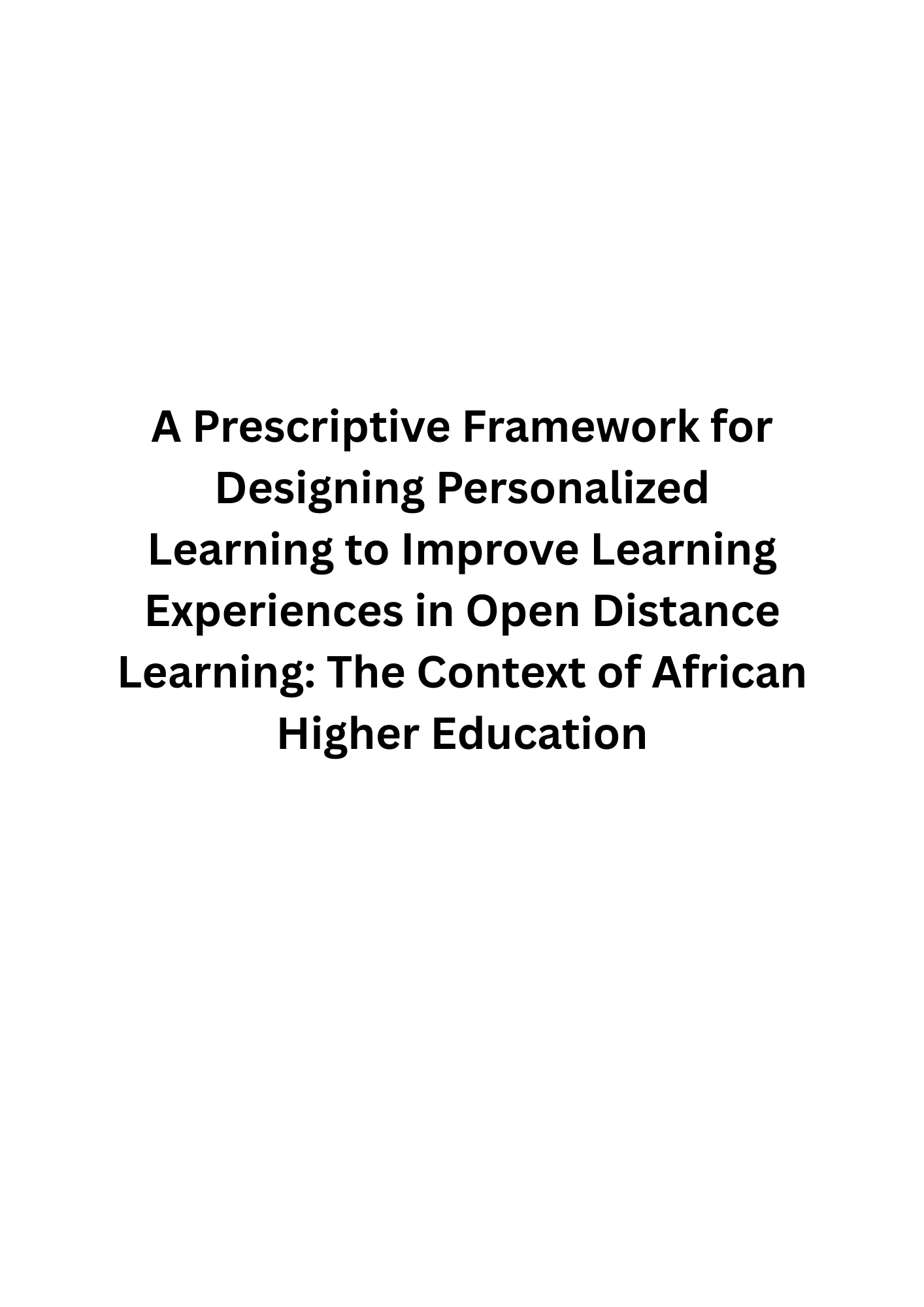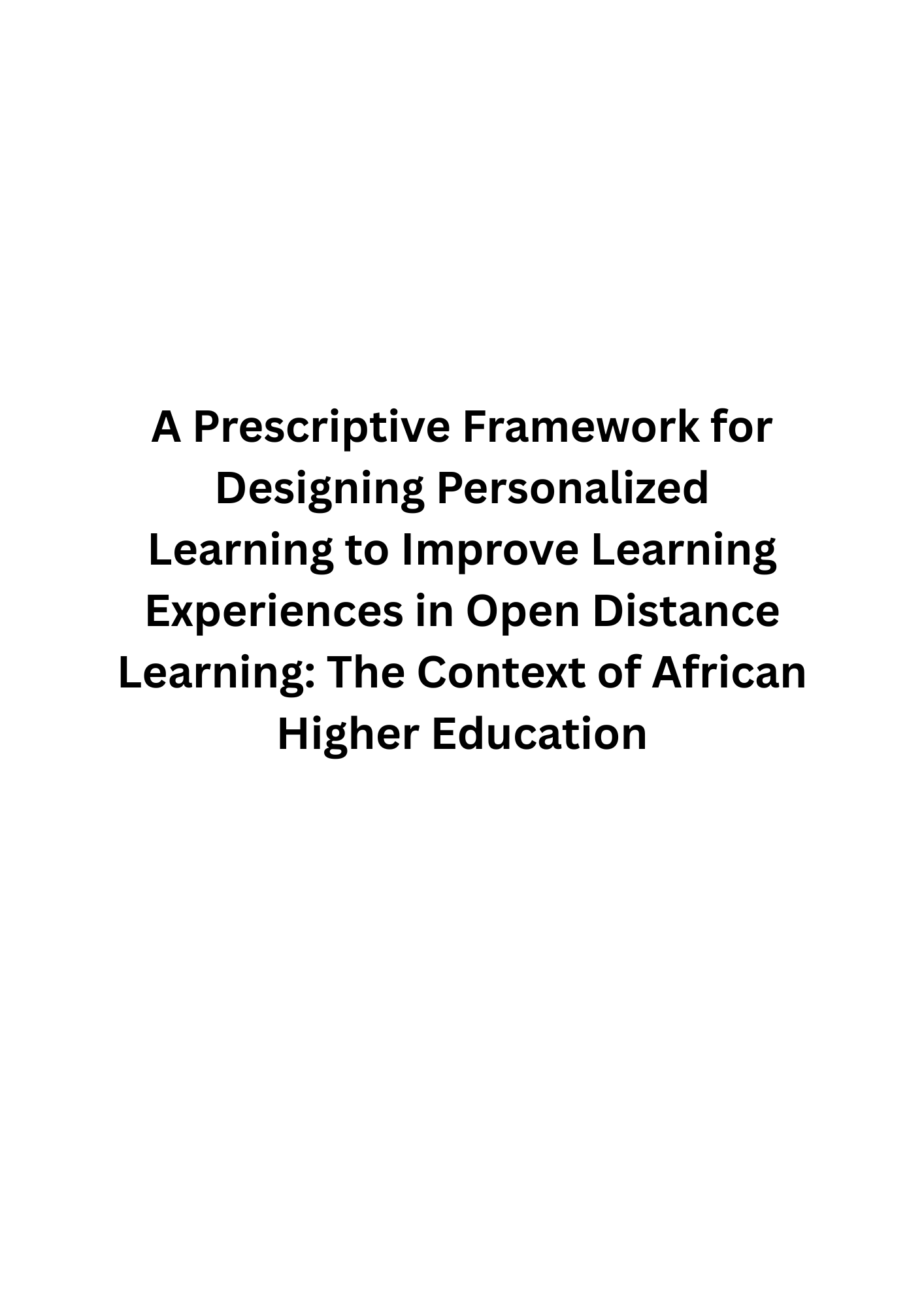Abstract
Background to the Study:
Personalized Learning (PL) has emerged as a transformative approach in education, emphasizing the individualization of learning experiences to enhance student outcomes. While PL has gained momentum in education settings, its application in the context of Open Distance Learning (ODL) institutions within the African continent remains underexplored. ODL institutions face unique challenges such as limited resources, outdated teaching methods, and diverse learners needs. The absence of personalization within the ODL environment has been associated with student dropout rates. Additionally, the current adopted e-learning platforms lack personalization, adaptability, and fail to address the diverse needs of distance learners. The existing Learning Management Systems (LMSs) are designed to support a one-size-fits-all approach and fail to meet the individual needs of learners which are unique.
Purpose/Aims of the Study:
The research objective is to design a prescriptive framework for designing PL in ODL institutions within the African context. To achieve this goal, the study seeks to answer the following question: "What elements comprise an effective framework for designing PL in an ODL environment?". The developed framework will assist educators (instructors/tutors, instructional designers, and administrators) in ODL environments in personalizing the learning process to cater to the needs of distance learners and improving their learning experiences. The instructors will be able to utilize the framework to personalize their respective courses and learning materials, aligning them with individual learners’ needs, such as their skills, abilities, learning styles, and prior knowledge.
Research Design:
The research design for this study is based on the philosophical assumption of pragmatism, which emphasizes practicality in bringing change and action in real world-settings. The study aims to develop a framework for personalizing learning in ODL environments within the African context. It adopts a constructive epistemological stance, focusing on knowledge that leads to action and change. The research strategy employed is Design Science Research (DSR), which involves creating innovative artifacts to address real-world problems. The DSR Methodology will be used to guide the research process, consisting of six phases: problem identification, objectives and solution, design and development, demonstration, evaluation, and communication. The study will utilize two cases, namely, the Open University of Tanzania and the University of South Africa as sources of requirements for the design and for naturalistic evaluation of the framework. Data collection will employ a mixed methods approach, gathering both quantitative and qualitative data through questionnaires and interviews.
Data Analysis
This study will follow the "Framework for Evaluation in Design Science Research" to guide the evaluation process. The evaluation will encompass both formative and summative components to ensure the quality of artifact development. Formative evaluation will be used to refine the framework during the framework design phases, employing Human Risk and Effectiveness as a strategy to assess the artifact in a real environment setting. Summative evaluation will be conducted at the end of the design phase to assess its flexibility in utilizing the framework in ODL environment. Data collected will be iteratively analyzed to refine and validate the framework during different cycles of the DSR process. Qualitative data analysis will be conducted using NVIVO software for thematic analysis, while descriptive statistical analysis will be carried out using SPSS.
Expected Contribution to Knowledge
The primary contribution of this study is the development of a framework (artifact) that will guide the design of PL within the context of African ODL institutions. The framework will serve as a valuable resource for educators, providing prescriptive knowledge and practical guidance on how to design personalisation of the learning process to meet the unique needs of individual distance learners, thereby enhancing overall online learning experiences. Furthermore, this study aligns with the concept of 'exaptation' knowledge, involving the adoption of existing solutions from various domains to address new challenges. The novelty of this study lies in the utilization of exaptation knowledge by developing an artifact that adapts solutions from other contexts. The framework's design will draw upon solutions found in the literature, theories, empirical studies, and strategies utilized or designed in other domains
Gallery 2
Explore the visual story of this exhibit

Title Image
